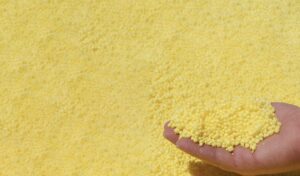Sulfur
Sulfur (often spelled “sulphur” in some regions) is an essential element for plant growth and development. It’s a vital component of various amino acids, vitamins, and enzymes necessary for plant metabolism. Sulfur plays a crucial role in photosynthesis, protein synthesis, and overall plant health.
Here’s how sulfur is used in agriculture:
Soil Amendment: Sulfur is applied to soil as a soil amendment to correct sulfur deficiencies. Soils low in organic matter or with high pH levels may lack sufficient sulfur for optimal plant growth. Elemental sulfur or sulfur-containing compounds such as gypsum (calcium sulfate) are commonly used to replenish sulfur levels in the soil.
Fertilizers: Sulfur-containing fertilizers, such as ammonium sulfate or potassium sulfate, are used to supply sulfur to plants. These fertilizers not only provide sulfur but also other essential nutrients like nitrogen and potassium. Fertilizers with sulfur are particularly important for crops with high sulfur requirements, such as brassicas (e.g., broccoli, cabbage), onions, garlic, and legumes (e.g., soybeans, peas).
Sulfur as a Pesticide: Sulfur is also used as a pesticide in agriculture, primarily as a fungicide to control various fungal diseases on crops. Sulfur-based fungicides are commonly used in organic farming and integrated pest management (IPM) systems to manage diseases like powdery mildew, rust, and certain mites.
Micronutrient Fertilization: In addition to its primary role as a macronutrient, sulfur is considered a micronutrient in some cases. It’s required in smaller quantities compared to macronutrients like nitrogen, phosphorus, and potassium. Some crops may benefit from micronutrient fertilization with sulfur, especially in soils with limited sulfur availability.
Enhancing Nutrient Uptake: Sulfur plays a role in improving nutrient uptake by plants. Adequate sulfur levels in the soil can enhance the plant’s ability to absorb other essential nutrients, such as nitrogen and phosphorus. This synergy between sulfur and other nutrients contributes to overall plant health, growth, and yield.
Environmental Considerations: While sulfur is essential for plant growth, excessive sulfur application can lead to environmental issues such as acidification of soil and water bodies. Therefore, it’s crucial to apply sulfur-based fertilizers judiciously, considering soil conditions, crop requirements, and environmental impacts.

NTEK Trading Company emerged in the 2000s as a thriving entity, offering exceptional business services in the field of production and export of Oil Derivatives, and boasting a team of accomplished managers.
With a skilled workforce, access to cutting-edge information, and strategic collaborations across multiple countries, Ntek has sustained a trajectory of continuous growth. Drawing from its vast experience in various industries, encompassing trade, production, and services, Ntek has garnered noteworthy accomplishments, serving our country and achieving excellence.
Leveraging its full potential, the company actively engages in diverse commercial activities, including the import and export of petroleum products from Iran, Iraq, Russia, Turkmenistan, and Azerbaijan.
NTEK Co, an Iranian company, aspires to establish a robust global presence, capitalizing on the knowledge gained from previous years and its dedicated and capable team. Presently, our focus lies in fostering collaboration among large importing companies, facilitating the exchange of information and technology, and creating a business consortium to address mutual needs.
We extend an invitation to join us in this endeavor, aiming to enhance our collective achievements for years to come. Our commitment is to earn your trust through our unwavering dedication, as it remains our primary duty and objective.
NTEK.CO currently maintains offices in Iran, Oman, and Turkey, while also collaborating with offices in Dubai, Malaysia, and Iraq.
See our products.




